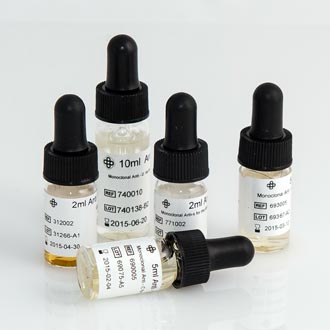RH NEGATIVE CONTROL (Lorne),monoclonal antibodies, 10ml, bot
Valid Article
RH NEGATIVE CONTROL (Lorne)
Definition
Negative control for monoclonal anti-D reagents, used to detect false positive reactions during ABO/rhesus blood grouping tests.
Used together with the anti-A, anti-B, anti-AB, anti Rh D grouping reagents.
Specifications
Components
- Proteins, additives and potentiators (no antibodies)
- Preservative agent: sodium azide
Technical specifications
Colourless reagent
Packaging & Labelling
10 ml dropper bottle, intended for 150 to 200 tests
Instructions for use
Follow the instructions in the leaflet.
The purpose of this reagent is to detect red cell autoagglutination that can give false-positive reactions with the anti-A, anti-B, anti-AB and rhesus anti-D blood grouping reagents.
It should be used as a negative control for all ABO/Rh blood grouping tests.
A positive reaction indicates that the specimen is reacting with the reagents' components and not with the antibodies.
A negative reaction offers assurance that the positive result obtained with anti-D reagents is due to a specific antigen-antibody reaction.
Storage
- Keep refrigerated between 2 and 8ºC
- Do not freeze
- Shelf life: 30 months
- Not to be used beyond expiry date
- Close the bottle tightly after each use to prevent bacterial contaminations (causing the deterioration of the serum-test).
MSF requirements
The 5 reagents for blood grouping (anti-AB, anti-A, anti-B, anti Rh D, Rhesus negative control) must all come from the same manufacturer. This is the reason why we close the article to 1 manufacturer.





![[KMEDMTRA03B] MODULE, TRANSFUSION, children, part 2, cold chain](/web/image/product.template/569933/image_256/%5BKMEDMTRA03B%5D%20MODULE%2C%20TRANSFUSION%2C%20children%2C%20part%202%2C%20cold%20chain?unique=fa95103)
![[KMEDMTRA01B] MODULE, TRANSFUSION, 50, part 2, cold chain](/web/image/product.template/569077/image_256/%5BKMEDMTRA01B%5D%20MODULE%2C%20TRANSFUSION%2C%2050%2C%20part%202%2C%20cold%20chain?unique=1da3daf)
![[ELABTILE1--] TILE, blood grouping, white and smooth](/web/image/product.template/571039/image_256/%5BELABTILE1--%5D%20TILE%2C%20blood%20grouping%2C%20white%20and%20smooth?unique=deb8c56)
![[SSDTBLOC1--] BEDSIDE CONTROL CARD, ABO compatibility (Serafol)](/web/image/product.template/568722/image_256/%5BSSDTBLOC1--%5D%20BEDSIDE%20CONTROL%20CARD%2C%20ABO%20compatibility%20%28Serafol%29?unique=6423df3)
![[SSDTBLOG1A-] BLOOD GROUPING TEST, anti A (Lorne), 10 ml, dropper bot.](/web/image/product.template/568666/image_256/%5BSSDTBLOG1A-%5D%20BLOOD%20GROUPING%20TEST%2C%20anti%20A%20%28Lorne%29%2C%2010%20ml%2C%20dropper%20bot.?unique=8bbd5ef)
![[SSDTBLOG1AB] BLOOD GROUPING TEST, anti AB (Lorne), 10 ml, dropper bot.](/web/image/product.template/568660/image_256/%5BSSDTBLOG1AB%5D%20BLOOD%20GROUPING%20TEST%2C%20anti%20AB%20%28Lorne%29%2C%2010%20ml%2C%20dropper%20bot.?unique=a61a5d2)
![[SSDTBLOG1B-] BLOOD GROUPING TEST, anti B (Lorne), 10 ml, dropper bot.](/web/image/product.template/568658/image_256/%5BSSDTBLOG1B-%5D%20BLOOD%20GROUPING%20TEST%2C%20anti%20B%20%28Lorne%29%2C%2010%20ml%2C%20dropper%20bot.?unique=a61a5d2)
![[SSDTBLOG1D-] BLOOD GROUPING TEST, RHESUS anti D (Lorne), 10 ml, drop.bot.](/web/image/product.template/568686/image_256/%5BSSDTBLOG1D-%5D%20BLOOD%20GROUPING%20TEST%2C%20RHESUS%20anti%20D%20%28Lorne%29%2C%2010%20ml%2C%20drop.bot.?unique=a61a5d2)